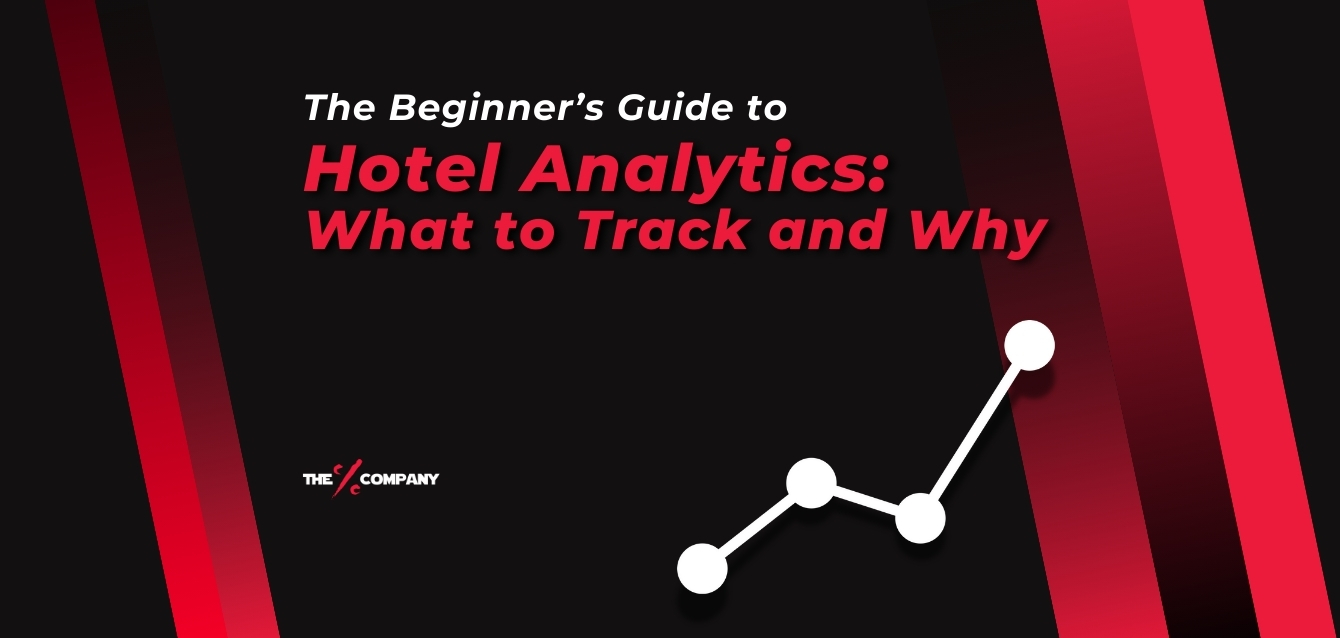Running a hotel in today’s competitive landscape means wearing many hats. As a Hotel operator or manager (GM), you’re not only responsible for guest satisfaction, staff performance, and operational efficiency but also for understanding the myriad of numbers and metrics behind your hotel’s success.
Hotel analytics can feel intimidating at first. There are acronyms, KPIs, dashboards, and digital marketing metrics that all seem important, but it can be difficult to know where to start. As a 25 year veteran of the digital marketing community (showing my age here), I can tell you that the tendency of most digital marketeers is to blind clients with science and numbers. So here I will try to de-mystify the key terms that hotel managers should know and break it all down simply and clearly. By the end, you’ll understand:
- The key hotel performance metrics every hotel operator should track
- How to connect operational data with digital marketing insights
- What numbers matter for driving direct bookings and improving profitability
- How to use tools like Google Analytics and The Percentage App to make better decisions
So whether you’re managing a boutique hotel, a resort, or serviced apartments, this guide should help you build a solid foundation in hotel analytics, without overwhelming you, starting with the basics and getting into some more technical stuff at the end. Lets get started:
Why Hotel Analytics Matter
Think of analytics as your hotel’s health check-up. If you don’t track the right numbers, you’re making decisions blindly. Proper hotel analytics help you:
- Understand guest behavior (who books, when, and why)
- Improve occupancy and ADR by adjusting rates intelligently
- Boost direct bookings and reduce dependency on OTAs
- Maximize marketing ROI by seeing which campaigns actually convert
- Forecast revenue more accurately for better budgeting
With the rise of online bookings, Google Ads, social media, and OTAs, digital marketing data now plays a crucial role alongside your traditional hotel KPIs.
Section 1: The core hotel KPIs every hotel GM must know
Let’s start with the foundation, your hotel’s core operating metrics. These numbers tell you how well your property is performing day to day.
1. Occupancy Rate (OCC)
![]()
- What it means: The percentage of available rooms that were sold over a given period.
- Why it matters: High occupancy can indicate strong demand, but it must be balanced with ADR to maximize revenue.
Example: If you sold 80 rooms out of 100 available, your occupancy rate is 80%.
2. Average Daily Rate (ADR)

- What it means: The average rate you earned per sold room.
- Why it matters: ADR helps you understand pricing power and informs your rate strategy.
Example: If you generated 400,000 THB from 200 rooms sold, your ADR is 2,000 THB.
3. Revenue Per Available Room (RevPAR)

- What it means: Combines occupancy and ADR into a single metric, showing how much revenue each available room generates.
- Why it matters: A high RevPAR means you’re pricing and selling rooms effectively
4. Gross Operating Profit Per Available Room (GOPPAR)

- What it means: Unlike RevPAR, GOPPAR includes operational expenses, giving you a better sense of profitability.
- Why it matters: Revenue is meaningless without profit. This metric helps you spot if rising costs are eroding margins.
5. Average Length of Stay (ALOS)

- What it means: The average number of nights guests stay per booking.
- Why it matters: Longer stays usually mean lower operational costs and higher revenue efficiency.
6. Booking Pace & Pickup
- Booking Pace: How far in advance guests book.
- Pickup: How many rooms are sold over a given period leading up to a date.
Why they matter: Monitoring booking pace helps with forecasting demand and adjusting rates dynamically.
Section 2: The digital marketing metrics hotels can’t ignore
Traditional KPIs are no longer enough. With most travelers discovering and booking hotels online, GMs need to understand digital marketing analytics as well.
Here are the essentials:
1. Website Traffic
- What it means: The number of visitors coming to your hotel’s website.
- Why it matters: Your website is your digital lobby / reception. The more qualified traffic you attract, the more direct bookings you can potentially generate.
- How to track: Use Google Analytics or similar tracking tool.
2. Conversion Rate
![]()
- What it means: The percentage of website visitors who end up making a booking.
- Why it matters: You can have thousands of visitors, but if your conversion rate is low, your site isn’t doing its job properly.
Pro Tip: The Percentage App’s booking engine typically outperforms generic booking engine platforms and systems by offering a wide range of additional features and points of customisation, which leads to increased conversion rates.
3. Cost Per Acquisition (CPA)

- What it means: How much it costs to acquire a direct booking. This can be expressed as a monetary amount or as i prefer, a percentage cost of booking.
- Why it matters: CPA shows whether your Google Ads, Meta Ads, or retargeting campaigns are profitable.
Tip: A cost per acquisition percentage may give a better understanding of profitability of your campaigns compared to OTA and other commission based channels.
4. Return on Ad Spend (ROAS)

- What it means: For every baht spent on ads, how much revenue you generate.
- Why it matters: If ROAS is below 3:1, you’re likely overspending or targeting the wrong audience.
5. OTA vs. Direct Booking Ratio
- What it means: The proportion of bookings coming through OTAs (like Booking.com or Agoda) versus your direct channels.
- Why it matters: High OTA reliance means lower margins due to commission fees.
- Goal: Shift towards direct bookings to maximize profitability.
Section 3: Connecting the Dots – Using Data for Smarter Decisions
Tracking KPIs is one thing. Acting on them is what drives growth. Here’s how to use analytics to improve your hotels digital sales and marketing performance:
1. Use Website Data to Guide Rate Strategy
If Google Analytics shows high website traffic but low conversion rates, it might mean:
- Your booking engine is outdated
- Guests aren’t seeing attractive offers
- The booking process is too complicated
With The Percentage App, you can deploy personalized offers, track conversion data in real time, and adjust rates to match demand.
2. Monitor Campaign Performance in Real Time
If you’re running Google Ads or Meta Ads, don’t just look at impressions. Track:
- Which campaigns drive bookings
- Which keywords convert best
- How much each booking costs
The Percentage App helps you know your exact ROI and increases your ad campaign conversion.
3. Forecast Occupancy More Accurately
By combining:
- Historical booking data
- Current pickup pace
- Website visitor trends
Using this data, you can predict high-demand periods and adjust pricing early, instead of reacting too late.
Section 4: Tools That Simplify Hotel Analytics
For beginners, analytics can feel overwhelming. That’s why we recommend consolidating your data into one central platform that connects to your PMS/Channel Manager and gives you all the insights you need to make the right decisions about your marketing campaigns. Unlike generic reservation systems or basic PMS dashboards, The Percentage App solution offers:
- Real-time KPI tracking
- Deep marketing integrations
- Personalized booking experiences
Section 5: Key takeaways for hotel operators and GMs
- Start simple: Focus on a few KPIs such as OCC, ADR, RevPAR, conversion rate, and CPA.
- Balance OTAs and direct bookings: Don’t be overly reliant on third-party platforms.
- Use data, not guesswork: Your pricing, marketing, and operational decisions should be driven by analytics.
- Invest in the right tools: Platforms like The Percentage App save time and increase profitability.
Final Thoughts
Hotel analytics aren’t just for revenue managers, they’re essential for every GM looking to stay competitive and hold his team accountable. By understanding the key KPIs and connecting them with digital marketing insights, you can make smarter, faster, and more profitable decisions.
At The Percentage, we believe the future of hotel success lies in data-driven personalization. Our booking engine in conjunction with the Google analytics platform helps you track what matters, convert more guests, and reduce OTA dependency.
Ready to Take Control of Your Hotel Analytics? Book a free demo of The Percentage App today and discover how integrated analytics can transform your direct bookings and marketing ROI.

Written By: Edward Kennedy
Co-Founder & Director at The Percentage Company. I started working on websites in 1997 and have been a full-time techie since 2001. I’m committed to leveraging the latest technologies and digital marketing techniques to drive efficiency & improve online sales for our hotel clients. I have a 20+ year track record of success in growing independent hospitality & real estate brands.






